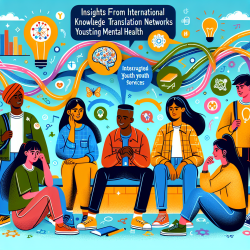Introduction
In the realm of youth mental health, creating effective systems of care requires a collaborative approach that integrates various services. The research article "Examining partnerships within an international knowledge translation network focused on youth mental health promotion" provides valuable insights into how partnerships can be developed and leveraged to enhance outcomes in youth mental health. This blog will explore key findings from the research and offer guidance for practitioners looking to improve their skills through the implementation of these findings.
The Role of Integrated Youth Services (IYS)
Integrated Youth Services (IYS) models are designed to provide holistic care by bringing together organizations that offer mental health, substance use, primary care, and social services. The Frayme network, an international knowledge translation (KT) network, supports the scaling and implementation of IYS by fostering partnerships and promoting knowledge exchange. The research utilized Social Network Analysis (SNA) to examine the Frayme network's partnerships, revealing crucial insights into the network's structure and effectiveness.
Key Findings from the Frayme Network
- Network Density and Centralization: The Frayme network demonstrated a density score of 20.6%, indicating that about one-fifth of all possible relationships have been established. The centralization score was 81.5%, suggesting a highly centralized network with most connections radiating from a core group of members.
- Trust and Value Perceptions: Overall trust within the network was high, with a score of 71.7%. The Frayme secretariat received high value ratings, indicating its role as a significant conduit for information and collaboration.
- Collaboration and Resource Sharing: The network emphasized knowledge sharing and resource contributions, with network connections and content expertise being the most frequently reported resources.
Implications for Practitioners
Practitioners can enhance their skills and improve outcomes by applying the following strategies derived from the research findings:
- Foster Strategic Partnerships: Focus on building relationships with organizations that offer complementary services and expertise. This can enhance the overall effectiveness of youth mental health interventions.
- Leverage Weak Ties: Utilize connections with partners who may not have direct relationships with each other to facilitate novel information exchange and collaboration.
- Enhance Value Perceptions: Increase awareness of the network's objectives and potential benefits among partners to improve perceptions of value and encourage active participation.
Encouraging Further Research
The findings from the Frayme network highlight the importance of continued research into knowledge translation networks and their impact on youth mental health. Practitioners are encouraged to explore further research opportunities to better understand how these networks can be optimized for greater effectiveness.
Conclusion
The research on the Frayme network provides valuable insights into the development and functioning of knowledge translation networks in youth mental health. By applying these findings, practitioners can enhance their skills and contribute to improved outcomes for children and youth. To read the original research paper, please follow this link: Examining partnerships within an international knowledge translation network focused on youth mental health promotion.










